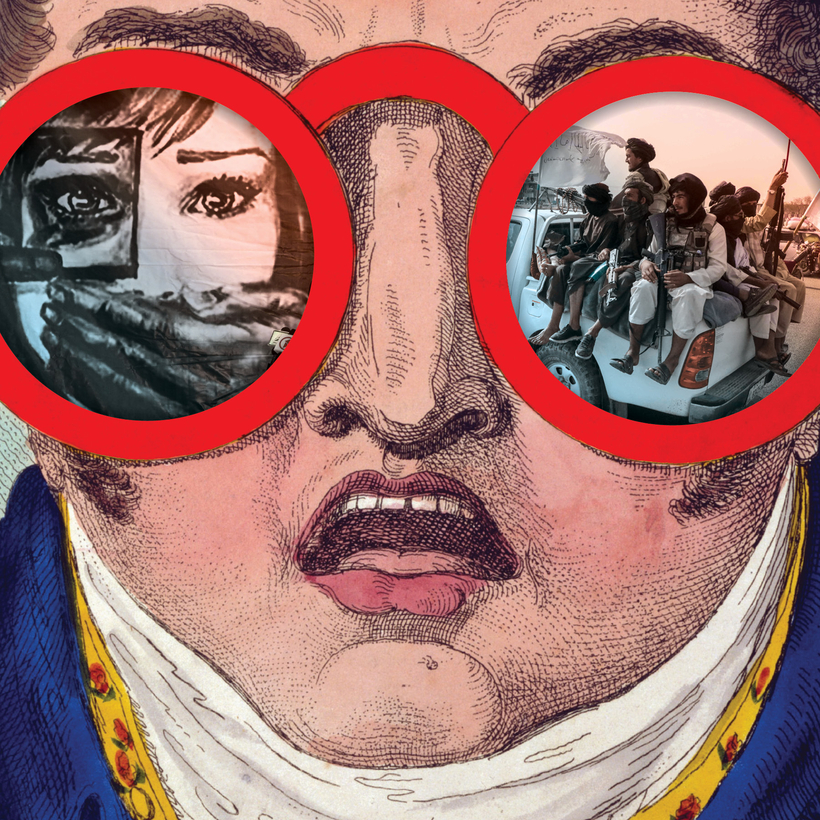We meant well. So, too, did the Soviets (some of them) when they occupied Afghanistan.
John Kifner, the intrepid New York Times reporter, told me about the time the paper sent him to report on conditions in the country just after the Soviet withdrawal, in 1989. John snuck across the Khyber Pass, hiked to a distant mountain village, and asked to talk to the chieftain. Over tea, John asked him if the Soviet occupiers had committed any atrocities. “Atrocities?” the elderly Afghan replied indignantly. “You have no idea how horrible it was.”
John, notebook and pen in hand, leaned in eagerly. The chieftain explained that when the Russians first entered the village, they separated the women from the men, and the children from the women. “And?,” John asked. “And,” the old man continued, “they tried to teach us how to read and write.” He paused ghoulishly. “Even the women.”

John, taken aback, feebly asked, “What happened next?” “Oh,” the chieftain replied, “our fighters rounded up the Russians and we killed them all.”
The Russians thought they were bringing socialism and modernity to a primitive land; little did they know they were instead sowing the seeds that would give rise to the Taliban and Osama bin Laden. The only regime the Soviets would succeed in toppling for good was their own, undone by a costly and misguided foreign intervention.
Today marks the 30th anniversary of the day the coup against Mikhail Gorbachev failed and drove the final nail in the coffin of the U.S.S.R. There were many causes, but the Soviets’ 10-year occupation of Afghanistan was a huge one.
The Russians thought they were bringing socialism and modernity to a primitive land; little did they know they were instead sowing the seeds that would give rise to the Taliban and Osama bin Laden.
For 20 years, we also thought we could impose our values on Afghanistan, even as we uprooted the Taliban. We failed, the Taliban is back, and now everyone’s dreading and fearing what comes next—in Kabul and also in our country.
Maybe we shrug off our guilt and gambol back to normal life like the departing rich, white tourists in the HBO hit The White Lotus, leaving the less fortunate behind to clean up our mess.

Or maybe, like the Soviets, we face more drastic consequences just ahead.
Afghanistan already is. And yet, with our help and also without it, Afghan society has evolved over the past 20 years. Saad Mohseni, the Afghan-Australian media mogul who brought newscasts, quiz shows, and entertainment to his country after the Taliban regime collapsed, in 2001, predicted in Air Mail three weeks ago that the Taliban won’t be able to return Afghanistan to the 14th century because too many young Afghans are now educated, believe in women’s rights, and have access to the Internet and social media.
Even as U.S. Embassy personnel were scrambling to get out, Mohseni’s news network, Tolo, kept women journalists on camera, interviewing Taliban leaders about their plans for the country. Will the Taliban snuff all that out after the last U.S. helicopter leaves? Plenty of people want to believe they can’t. At least not like before.
The problem is that even if Afghanistan has changed, the U.S. hasn’t. We keep repeating our own mistakes, the Soviets’ mistakes, and those of the British Empire. (If the planet lasts long enough, the Chinese are sure to follow.)
And then, riddled with shame and guilt, and anger—How could we lose?—we repeat the blame game over and over: Biden, for relying on wishful-thinking intelligence and not planning for a worst-case scenario, then Trump, then Obama, and most of all George W. Bush, who was the first and most blinkered bungler-in-chief. (The buck actually stops in Crawford, Texas.)
As we watch the déjà vu horror of choppers evacuating the U.S. Embassy and leaving allies behind, it feels good to vent and blame misguided leaders that we voted for or didn’t do enough to stop.
But blaming politicians and feeling bad about what’s happening won’t do the Afghans any good.
If the U.S. government failed 39 million Afghan citizens, many of whom trusted us and worked with U.S. forces, that doesn’t mean we have to. As it did after the last botched surrender, in Vietnam, Washington will surely airlift and give sanctuary to as many Afghan employees as it can. Other countries (even Albania) have pledged to take in Afghans fleeing the Taliban. But American civilians can also help. So instead of engaging in any more castigating, told-you-so lectures, we want to offer a few practical ways for readers to help, not the entire country of Afghanistan, but at least some of the people trying to escape the mayhem. Compassion and guilt fade quickly, so the time to do something, however small, is now.
Alessandra Stanley is a Co-Editor of Air Mail


